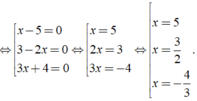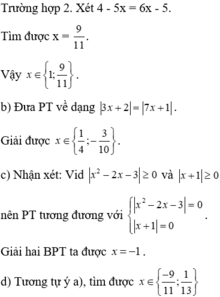Giải các phương trình sau: (x - 5)(3 - 2x)(3x + 4) = 0

Những câu hỏi liên quan
1) Giải các phương trình sau : a) x-3/x=2-x-3/x+3 b) 3x^2-2x-16=0 2) Giải bất phương trình sau: 4x-3/4>3x-5/3-2x-7/12
\(a,\dfrac{x-3}{x}=\dfrac{x-3}{x+3}\)\(\left(đk:x\ne0,-3\right)\)
\(\Leftrightarrow\dfrac{x-3}{x}-\dfrac{x-3}{x+3}=0\)
\(\Leftrightarrow\dfrac{\left(x-3\right)\left(x+3\right)-x\left(x-3\right)}{x\left(x+3\right)}=0\)
\(\Leftrightarrow x^2-9-x^2+3x=0\)
\(\Leftrightarrow3x-9=0\)
\(\Leftrightarrow3x=9\)
\(\Leftrightarrow x=3\left(n\right)\)
Vậy \(S=\left\{3\right\}\)
Đúng 1
Bình luận (0)
\(b,\dfrac{4x-3}{4}>\dfrac{3x-5}{3}-\dfrac{2x-7}{12}\)
\(\Leftrightarrow\dfrac{4x-3}{4}-\dfrac{3x-5}{3}+\dfrac{2x-7}{12}>0\)
\(\Leftrightarrow\dfrac{3\left(4x-3\right)-4\left(3x-5\right)+2x-7}{12}>0\)
\(\Leftrightarrow12x-9-12x+20+2x-7>0\)
\(\Leftrightarrow2x+4>0\)
\(\Leftrightarrow2x>-4\)
\(\Leftrightarrow x>-2\)
Đúng 1
Bình luận (0)
Giải các phương trình sau: ( x - 5 )( 3 - 2x )( 3x + 4 ) = 0
Ta có: ( x - 5 )( 3 - 2x )( 3x + 4 ) = 0

Vậy phương trình đã cho có tập nghiệm là S = { - 4/3; 3/2; 5 }.
Đúng 0
Bình luận (0)
Giải các phương trình, bất phương trình sau:
1) \(\sqrt{3x+7}-5< 0\)
2) \(\sqrt{-2x-1}-3>0\)
3) \(\dfrac{\sqrt{3x-2}}{6}-3=0\)
4) \(-5\sqrt{-x-2}-1< 0\)
5) \(-\dfrac{2}{3}\sqrt{-3-x}-3>0\)
1) \(\sqrt[]{3x+7}-5< 0\)
\(\Leftrightarrow\sqrt[]{3x+7}< 5\)
\(\Leftrightarrow3x+7\ge0\cap3x+7< 25\)
\(\Leftrightarrow x\ge-\dfrac{7}{3}\cap x< 6\)
\(\Leftrightarrow-\dfrac{7}{3}\le x< 6\)
Đúng 0
Bình luận (0)
Bài 3: Giải các phương trình sau:
a) 2x – 5 = 0 b) 12 – 3x = 3( 4-x) c) 2(x – 3) = 2x-1
Giải các phương trình sau:
(2x-5)^3 -(3x-4)^3+(x+1)^3=0
\(\left(2x-5\right)^3-\left(3x-4\right)^3+\left(x+1\right)^3=0\)
\(\Leftrightarrow\left(2x-5-3x+4\right)\left[\left(2x-5\right)^2+\left(2x-5\right)\left(3x-4\right)+\left(3x-4\right)^2\right]+\left(x+1\right)^3=0\)
\(\Leftrightarrow-\left(x+1\right)\left[\left(2x-5\right)^2+\left(2x-5\right)\left(3x-4\right)+\left(3x-4\right)^2\right]+\left(x+1\right)^3=0\)
\(\Leftrightarrow\orbr{\begin{cases}x+1=0\\\left(x+1\right)^2-\left(2x-5\right)^2-\left(2x-5\right)\left(3x-4\right)-\left(3x-4\right)^2=0\left(1\right)\end{cases}}\)
\(\left(1\right)\Leftrightarrow\left(x+1+2x-5\right)\left(x+1-2x+5\right)-\left(2x-5\right)\left(3x-4\right)-\left(3x-4\right)^2=0\)
\(\Leftrightarrow\left(3x-4\right)\left(6-x-2x+5-3x+4\right)=0\)
\(\Leftrightarrow\orbr{\begin{cases}3x-4=0\\-6x+15=0\end{cases}\Leftrightarrow\orbr{\begin{cases}x=\frac{4}{3}\\x=\frac{-5}{2}\end{cases}}}\)
Giải các phương trình sau (2x-5) mũ 3 - (3x-4) mũ 3 + (x+1) mũ 3=0
Đặt a = 2x - 5; b = 3x - 4 => x + 1 = b - a
Khi đó ta có pt: a3 - b3 + (b - a)3 = 0
<=> (b - a)3 - (b3 - a3) = 0
<=> b3 - a3 - b3 + a3 - 3ab(b - a)= 0
<=> 3ab(b - a) = 0 <=> a = 0 hoặc b = 0 hoặc a= b
* Với a = 0, ta có: 2x - 5 = 0 <=> x = \(\frac{5}{2}\)
* Với b = 0, ta có: 3x - 4 = 0 <=> x = \(\frac{4}{3}\)
* Với a = b, ta có: 2x - 5 = 3x - 4 <=> x = -1
Vậy S = {-1;\(\frac{4}{3}\);\(\frac{5}{2}\)}
Xem thêm câu trả lời
Giải các phương trình sau:a)
4
−
5
x
5
−
6
x
;
b)
3
x
+
2
−
7
x
+
1
0
;
c)...
Đọc tiếp
Giải các phương trình sau:
a) 4 − 5 x = 5 − 6 x ; b) 3 x + 2 − 7 x + 1 = 0 ;
c) x 2 − 2 x − 3 + x + 1 = 0 ; d) 1 4 x − 5 = 3 x + 1
a) Trường hợp 1. Xét 4 - 5x = 5 - 6x.
Tìm được x = 1.

Đúng 0
Bình luận (0)
Giải các phương trình sau. 2x-1=2-x ; x-5x-1/6=8-3x/4. ; x/3 - 2x+1/2=x/6 - x ; (2x-5)(x+3)=0. ; (1-7)(2+x)=0
Bạn cần viết đề bằng công thức toán (biểu tượng $\sum$ góc trái khung soạn thảo) đẻ được hỗ trợ tốt hơn. Viết như thế kia rất khó đọc => khả năng bị bỏ qua bài cao.
Đúng 0
Bình luận (0)
a: =>3x=3
=>x=1
b: =>12x-2(5x-1)=3(8-3x)
=>12x-10x+2=24-9x
=>2x+2=24-9x
=>11x=22
=>x=2
c: =>2x-3(2x+1)=x-6x
=>-5x=2x-6x-3=-4x-3
=>-x=-3
=>x=3
d: =>2x-5=0 hoặc x+3=0
=>x=5/2 hoặc x=-3
e: =>x+2=0
=>x=-2
Đúng 0
Bình luận (0)
3.15 giải các phương trình sau :
a) ( x - 6 ) ( 2x - 5 ) ( 3x + 9 ) = 0
b) 2x( x - 3 ) + 5( x - 3 ) = 0
c) ( x^2 - 4 ) - ( x - 2 ) ( 3 - 2x ) =0
3.16 tìm m để phương trình sau có nghiệm :
x=-7 ( 2m - 5 )x - 2m^2 + 8
3.17 giải các phương trình sau :
a) ( 2x - 1 )^2 - ( 2x + 1 ) = 0
\(a,\left(x-6\right)\left(2x-5\right)\left(3x+9\right)=0\Leftrightarrow\left[{}\begin{matrix}x-6=0\Leftrightarrow x=6\\2x-5=0\Leftrightarrow x=\dfrac{5}{2}\\3x+9=0\Leftrightarrow x=-3\end{matrix}\right.\)
\(b,2x\left(x-3\right)+5\left(x-3\right)=0\Leftrightarrow\left(2x+5\right)\left(x-3\right)=0\Leftrightarrow\left[{}\begin{matrix}x-3=0\Leftrightarrow x=3\\2x+5=0\Leftrightarrow x=-\dfrac{5}{2}\end{matrix}\right.\)
\(c,x^2-4-\left(x-2\right)\left(3-2x\right)=0\Leftrightarrow\left(x-2\right)\left(x+2\right)-\left(x-2\right)\left(3-2x\right)=0\Leftrightarrow\left(x-2\right)\left(x+2-3+2x\right)=0\Leftrightarrow\left[{}\begin{matrix}x=2\\x=\dfrac{1}{3}\end{matrix}\right.\)
\(x=-7\left(2m-5\right)x-2m^2+8\Leftrightarrow x+7\left(2m-5\right)=8-2m^2\Leftrightarrow x\left(14m-34\right)=8-2m^2\)
\(ycđb\Leftrightarrow14m-34\ne0\Leftrightarrow m\ne\dfrac{34}{14}\)\(\Rightarrow x=\dfrac{8-2m^2}{14m-34}\)
\(3.17\Leftrightarrow4x^2-4x+1-2x-1=0\Leftrightarrow4x^2-6x=0\Leftrightarrow x\left(4x-6\right)=0\Leftrightarrow\left[{}\begin{matrix}x=0\\x=\dfrac{3}{2}\end{matrix}\right.\)
Đúng 2
Bình luận (0)
3.15:
a, \(\Leftrightarrow\left\{{}\begin{matrix}x-6=0\\2x-5=0\\3x+9=0\end{matrix}\right.\Leftrightarrow\left\{{}\begin{matrix}x=6\\x=\dfrac{5}{2}\\x=-\dfrac{9}{3}=-3\end{matrix}\right.\)
b, \(\Leftrightarrow\left(x-3\right)\left(2x+5\right)=0\)
\(\Leftrightarrow\left\{{}\begin{matrix}x-3=0\\2x+5=0\end{matrix}\right.\Leftrightarrow\left\{{}\begin{matrix}x=3\\x=-\dfrac{5}{2}\end{matrix}\right.\)
c, \(\Leftrightarrow\left(x-2\right)\left(x+2\right)-\left(x-2\right)\left(3-2x\right)=0\)
\(\Leftrightarrow\left(x-2\right)\left(x+2-3+2x\right)=0\)
\(\Leftrightarrow\left\{{}\begin{matrix}x-2=0\\3x-1=0\end{matrix}\right.\Leftrightarrow\left\{{}\begin{matrix}x=2\\x=\dfrac{1}{3}\end{matrix}\right.\)
3.16
\(\Leftrightarrow\left(2m-5\right).-7-2m^2+8=0\)
\(\Leftrightarrow-14m+35-2m^2+8=0\)
\(\Leftrightarrow-14m-2m^2+43=0\)
\(\Leftrightarrow-2\left(7m+m^2\right)=-43\)
\(\Leftrightarrow m\left(7-m\right)=\dfrac{43}{2}\)
\(\Leftrightarrow\dfrac{m\left(7-m\right)}{1}-\dfrac{43}{2}=0\)
\(\Leftrightarrow\dfrac{14m-2m^2}{2}-\dfrac{43}{2}=0\)
pt vô nghiệm
Đúng 1
Bình luận (0)





















